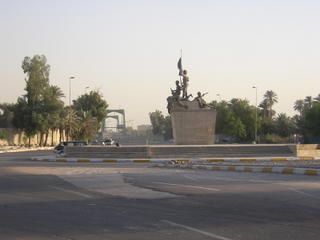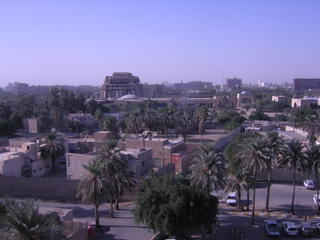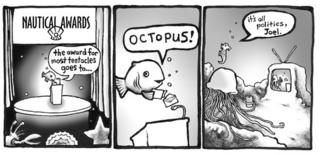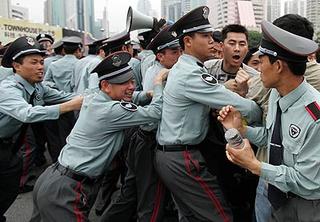A friend sent me a link to this post, a very well-written glance at the difference between the military's and media's perspectives (via the
New Libertarian site). I'm reproducing the whole thing here because it's so interesting, but go there to check it out yourself.
One Marine’s viewPosted by: McQ on Friday, September 30, 2005
Yes, it's anecdotal, but I also think it is representative of a great many within the military at large in terms of how they view the protests against the war, and why most are simply not very sympathetic or supportive of the anti-war view. The marine in question is a reservist and a colonel. He's recently returned from Iraq.
His name is Jeff Vold. First some perspective which is sorely lacking from most news reports:
Vold puts the continuing sporadic violence in perspective. Most of Iraq, he says, is quiet. "Baghdad is a vibrant city, the size of Chicago's metro area. A bomb goes off—it's a bad thing, but it's like we're sitting in Eden Prairie and a bomb goes off in Andover. The police investigate, people go about their business. Rush hour is one big traffic jam."
In other words, Iraq doesn't grind to a halt everytime there's a bomb blast. And for a majority of Iraq, it isn't something they particularly worry about anymore since the majority of the country is, in relative terms, quiet.His view of the reporting about Iraq?
"When I got back from Iraq, I was disappointed—astounded, really—to read the news. The media was saying it's all a failure, while we saw successes around us every day."
This seems to be a predictable response now. Almost every veteran of Iraq I've seen interviewed seems to echo this theme. "That isn't what I've seen". His overall view of the anti-war protests?
Antiwar demonstrators sometimes claim that their prime motivation is concern for the safety of American troops. "Support the troops," the lawn signs say, "bring them home."But it doesn't work that way, says Vold. "I try not to take it personally. The reason I'm a Marine is to ensure this is a free country. But I don't think the protesters know the effect they're having on the soldiers. You're always tired, cold or hot, homesick. The last thing you need is a sense that people back home say your mission is doomed, when you see good things happening all the time."Vold adds that antiwar rhetoric sometimes implicitly portrays soldiers as dupes on a fool's errand. "We volunteered to go to Iraq. The guys over there, who know the situation best, are re-enlisting in great numbers. Most of the guys I served with think this is the best thing America has done in our careers."
Again, having deep connections with many still in the military, the two empasized lines are what I constantly hear from those serving today. They can't believe people are protesting against something they volunteered to do and, on the whole, think is the right thing to do.This is not Vietnam, this is not a draft army and this is not an unwinnable war. And the guys in the middle of it know that. So they're mystified and miffed about the growing lack of support for their mission.And how are the protests playing in Iraq?
How did the Sheehan protest play in Iraq? Yesterday, I asked Vold's friend, Lt. Col. James MacVarish, an adviser to Iraqi troops in Fallujah. He told me in an e-mail that the Iraqis he works with believe such protests and the press they generate "play directly to the strengths of our mutual enemy." Iraqis "are absolutely astounded," he adds, "that we 'allow' that to continue." A few days ago, he had to give his Iraqi colleagues an hourlong civics lesson on freedom of the press.MacVarish says that the terrorists can't win militarily. So their strategy is to make the U.S. and Iraqi people "bleed a little every day." They hope that the resulting media attention will turn the tide of American opinion against the war, and make the political cost of sustaining it too high. "The more play the press gives Cindy Sheehan," MacVarish concludes, "the better the terrorists' chances are of ultimately succeeding here."What would a terrorist victory mean? "If we leave before the new government is established and the Iraqi Army is ready," says Vold, "the people will be at the mercy of the bad guys"—beheaders and torturers, who blow up children. MacVarish minces no words: "If the terrorists win over here, stand by. There will be no stopping them anywhere in the world."
Now, we can argue till the cows come home as to whether the line I've highlighted is actually true or not. I certainly think it is. But we know for a fact that the terrorists have mentioned the protests and are using them for their propaganda value. And that plays into the perception bin Laden had, based on the Somolia debacle, that if he could inflict enough casualties, America would eventually turn tail and run. The anti-war crowd plays perfectly to that perception.The question remains: in what real and concrete way are the anti-war protesters positively supporting the troops they claim to be supporting?I, for one, see nothing in that regard which is positive, helpful or supportive. But I do see their protests as both helpful and supportive to the enemies of our troops.That's certainly something the Sheehan contingent of the extreme left will have to live with in the future. But frankly, they're so possessed with a hatred of George Bush, I don't really think they care one way or the other about the troops, as long as whatever happens in Iraq somehow hurts Bush. This isn't really a principled opposition which at heart has a real love of the troops. The troops are simply a cover for an "anti-war" movement which is more about the pure, unadulterated and unbridled hatred of a man than support of anything military.
A pretty sad state of affairs if you ask me.








